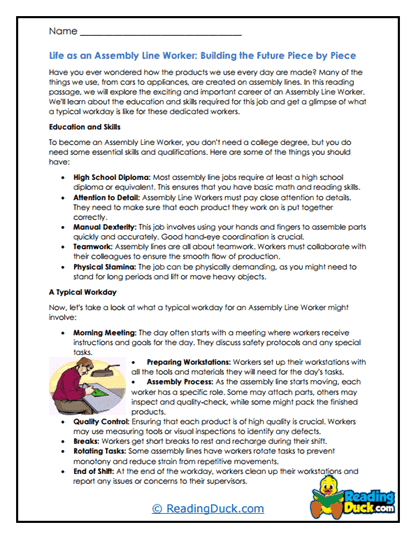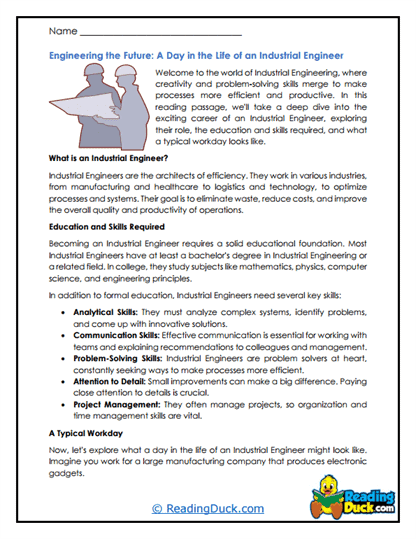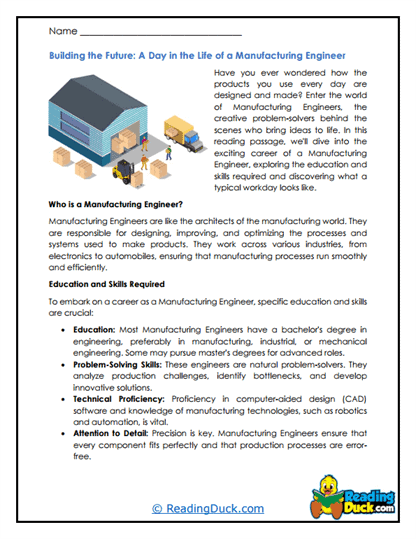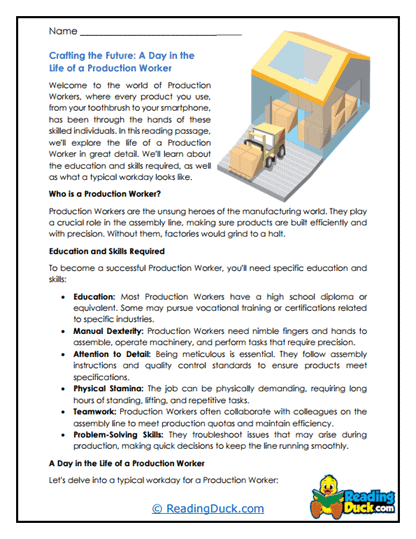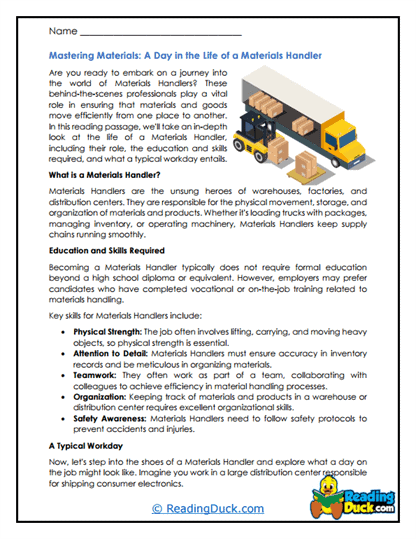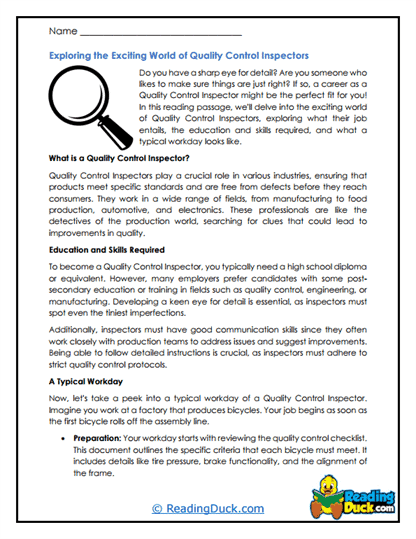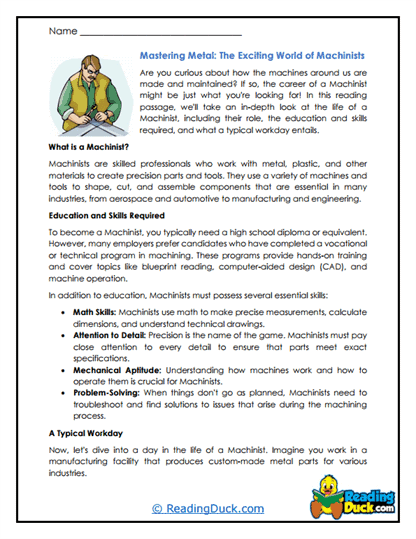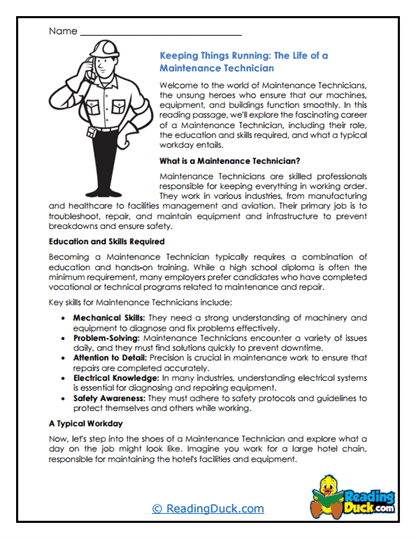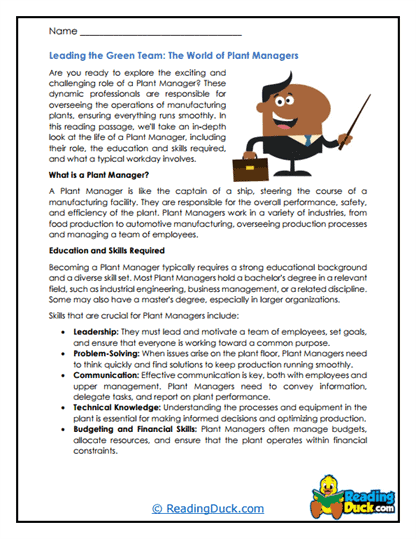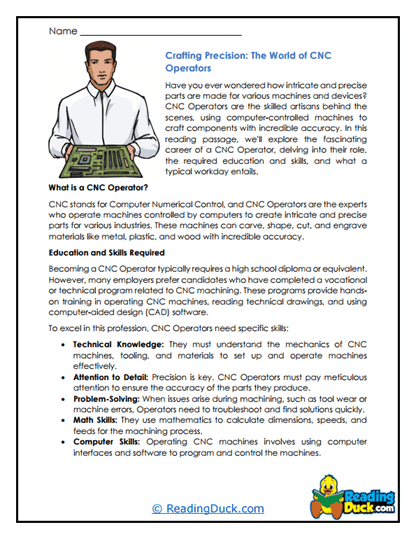Careers in Manufacturing Worksheets
About Our Careers in Manufacturing Worksheets
Our Careers in Manufacturing Worksheets provide students with a comprehensive introduction to the diverse and essential field of manufacturing. These worksheets are designed to help students explore various careers within the manufacturing sector, from hands-on roles like machine operators and assemblers to high-tech positions in robotics, quality control, and production management. By engaging with these materials, students will gain a better understanding of the opportunities available in manufacturing and the skills and education needed to thrive in this industry.
This topic contains several worksheet sets, each focusing on a specific aspect of manufacturing careers. Each worksheet set includes:
- Multiple Choice Questions: These questions assess students' comprehension of the reading passages, focusing on key details about different manufacturing careers, the required skills, and the educational pathways to success.
- Short Answer Questions: Students are prompted to provide concise responses, summarizing important information, analyzing the roles and responsibilities of various manufacturing professionals, and reflecting on the impact of manufacturing on the economy and society.
- Open-Ended Questions: These questions encourage students to think critically and express their personal interpretations, opinions, and preferences related to the manufacturing topics they have read about, fostering a deeper connection to the subject matter.
These worksheets are designed to help students demonstrate their understanding of manufacturing careers while fostering meaningful engagement with the opportunities available in this vital field. An answer key is provided for each question sheet, making it easy for teachers and parents to evaluate student progress. The worksheets are available in PDF format, ensuring they can be easily viewed electronically, downloaded, and printed.
Building the Future: Exploring Careers in Manufacturing
Manufacturing is a cornerstone of the global economy, responsible for creating the goods and products that power our daily lives. From cars and electronics to medical devices and food products, nearly everything we use is a result of manufacturing processes. Understanding careers in manufacturing allows students to see how their interests in technology, problem-solving, and hands-on work can lead to rewarding careers that have a direct impact on the world. By exploring these fields, students can gain a multi-faceted understanding of the manufacturing industry and discover how they can contribute to the production of high-quality goods that meet the needs of consumers and businesses alike.
Students exploring careers in manufacturing will delve into several key aspects:
- Diverse Career Opportunities: The manufacturing industry offers a wide array of careers, each with its own unique focus and skill set. Students will explore roles such as machine operators, who run and maintain the equipment that produces goods; quality control inspectors, who ensure that products meet established standards; and production managers, who oversee the entire manufacturing process from start to finish. They will also learn about careers in emerging areas such as robotics and automation, where professionals design and program machines to perform complex tasks, and supply chain management, where experts coordinate the movement of materials and products to ensure efficient production. Understanding the variety of careers in manufacturing helps students see the broad spectrum of possibilities within this industry, from hands-on technical roles to strategic positions in production planning and management.
- Educational Pathways and Skill Development: A successful career in manufacturing often requires a blend of formal education, technical training, and hands-on experience. Students will explore the different educational pathways available, from apprenticeships and vocational training programs to degrees in engineering, industrial technology, or operations management. They will also learn about the essential skills needed in manufacturing, such as attention to detail, mechanical aptitude, problem-solving, and the ability to work as part of a team. By understanding these pathways and skills, students can better plan their educational journeys and career goals within the manufacturing sector.
- Impact of Manufacturing on Society: Careers in manufacturing are not just about making products—they are about driving innovation and supporting the economy. Students will explore how manufacturing professionals contribute to advancements in various industries, including automotive, aerospace, healthcare, and consumer goods. They will learn about the role of manufacturing in creating jobs, boosting local economies, and enabling the production of goods that improve quality of life. This exploration highlights the significant impact that manufacturing has on society and encourages students to think about how they might use their skills to contribute to the industry's continued success.
- Challenges and Rewards of Manufacturing Careers: While manufacturing careers can be incredibly rewarding, they also come with their own set of challenges. Students will examine some of the common challenges manufacturing professionals face, such as maintaining production efficiency, ensuring workplace safety, and adapting to new technologies. They will also explore the rewards of working in manufacturing, including the satisfaction of producing tangible products, the opportunity to work in a dynamic and evolving field, and the potential for career growth and job stability. Understanding these challenges and rewards helps students gain a realistic perspective on what it means to work in manufacturing.
- Global and Local Perspectives on Manufacturing: The manufacturing industry operates on both a global and local scale, impacting economies, communities, and individuals around the world. Students will explore how manufacturing careers contribute to global trade, international business, and the development of new products that meet global demand. They will also consider the local dimensions of manufacturing, such as working in regional factories, supporting local businesses, or developing products tailored to specific markets. By understanding these perspectives, students can appreciate the interconnectedness of manufacturing with global and local economies.
- Innovation and Future Trends in Manufacturing: The manufacturing industry is continually evolving, with new technologies and approaches transforming the way products are made. Students will explore emerging trends in manufacturing, such as additive manufacturing (3D printing), smart factories, and sustainable production methods. They will learn about careers in fields that are pushing the boundaries of what is possible, such as robotics engineering, industrial design, and environmental management. This exploration encourages students to think about how they might contribute to the future of manufacturing through innovation and creative problem-solving.
Through the study of careers in manufacturing, students will gain a comprehensive understanding of the opportunities available in this field, the importance of manufacturing in society, and the skills and knowledge required to succeed in a manufacturing career.
Integration of These Worksheets In A Learning Curriculum
Integrating the study of careers in manufacturing into a learning curriculum can provide students with valuable insights and practical knowledge that extend beyond the classroom. Here are some practical ideas for using these worksheets in various subjects:
- Technology and Engineering Classes: Use the worksheets in technology and engineering classes to help students explore the connections between their studies and real-world manufacturing careers. These worksheets can serve as the foundation for discussions, projects, and hands-on activities that allow students to apply what they have learned to manufacturing-related challenges.
- Career and Technical Education (CTE): Integrate the worksheets into CTE courses focused on manufacturing, industrial technology, and engineering. These worksheets can help students explore specific career paths within the manufacturing sector, understand the skills required, and plan their educational and career goals accordingly.
- Mathematics Classes: Incorporate the worksheets into mathematics classes to help students see the practical applications of math in manufacturing. Students can work on problems related to production planning, quality control, or cost analysis, reinforcing their understanding of mathematical concepts in an industrial context.
- Interdisciplinary Projects: Encourage students to participate in interdisciplinary projects that combine manufacturing studies with other subjects, such as science, business, or environmental studies. For example, students could work on a project to design a sustainable product, analyze the environmental impact of a manufacturing process, or develop a business plan for a new manufacturing venture.
- Manufacturing Clubs and Competitions: Use the worksheets to inspire students to participate in manufacturing clubs or competitions. Students can use the knowledge gained from the worksheets to develop prototypes, create production plans, or compete in challenges related to manufacturing processes, allowing them to apply their skills in practical and competitive environments.
- Field Trips and Guest Speakers: Enhance the learning experience by organizing field trips to manufacturing plants, research and development facilities, or companies that specialize in industrial design. Additionally, invite guest speakers from different manufacturing careers to share their experiences and insights with students, providing them with a real-world perspective on the opportunities available in the field of manufacturing.
- Hands-On Activities: Complement the worksheets with hands-on activities such as building models, conducting quality control tests, or using computer-aided design (CAD) software. These activities allow students to apply their learning in practical ways, reinforcing the concepts covered in the worksheets.
Studying careers in manufacturing through these worksheets can significantly enhance students' problem-solving, critical thinking, and technical skills. By exploring the diverse opportunities within manufacturing, students develop a greater appreciation for the vital role this field plays in innovation, production, and global trade. These skills not only contribute to academic success but also prepare students for informed decision-making and potential future careers in this essential field. Encouraging curiosity and interest in manufacturing can lead to a lifelong engagement with the industry and its impact on the world.
